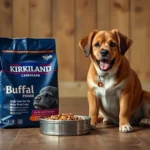
Introduction
Balanced nutrition is vital for our furry companions, ensuring they lead healthy, active lives. Dogs, like humans, have specific dietary needs that vary among different breeds. Some may thrive on high-protein diets, while others might require more fiber or fewer calories. As pet owners become increasingly aware of these needs, the search for nutritious and beneficial food options continues to grow.
One such option gaining popularity is goat’s milk. With a rich history in pet nutrition, goat’s milk has become a favored choice among dog owners looking to enhance their pets’ diets. Its unique properties and numerous benefits are making it a go-to supplement in the realm of canine nutrition.
Understanding the Nutritional Value of Goat’s Milk
Composition of Goat’s Milk
When comparing goat’s milk to cow’s milk and other dairy types, several distinct differences emerge. Goat’s milk contains a higher concentration of certain nutrients, including vitamins A and B, potassium, and magnesium.
Nutritional Breakdown:
- Proteins: Goat’s milk has a different protein structure, which can make it easier for dogs to digest.
- Fats: It contains medium-chain fatty acids, which are beneficial for energy and overall health.
- Vitamins and Minerals: Goat’s milk is rich in calcium, phosphorus, and potassium, essential for bone health and metabolic functions.
Digestibility
One of the remarkable features of goat’s milk is its digestibility, especially for dogs suffering from lactose intolerance. Compared to cow’s milk, goat’s milk has lower lactose levels and smaller fat globules, making it easier for dogs to absorb. This characteristic can significantly benefit dogs that struggle with digestive issues related to lactose.
Health Benefits of Goat’s Milk for Dogs
Rich Source of Nutrients
Goat’s milk is packed with essential vitamins and minerals that promote overall dog health. Key nutrients include:
- Calcium: Critical for strong bones and teeth.
- Potassium: Important for heart and muscle function.
- Vitamin A: Supports vision and immune function.
These nutrients work synergistically to enhance your dog’s wellbeing.
Boosting Immune System
Incorporating goat’s milk into your dog’s diet can help bolster their immune system. The presence of various immune-boosting nutrients helps in enhancing the body’s resistance to infections. A study published in veterinary nutrition journals indicated that the probiotics found in goat’s milk can play a vital role in strengthening the immune response in dogs.
Promoting Healthy Skin and Coat
The fatty acids present in goat’s milk are beneficial for maintaining a healthy skin and coat. These fatty acids help to nourish the skin, reducing dryness and irritation. Dogs with skin allergies or sensitivities may experience significant improvement after incorporating goat’s milk into their diets, as it helps soothe and hydrate the skin.
Improving Digestive Health
The probiotics found in goat’s milk contribute to a healthy gut flora, which is essential for good digestive health. For dogs with gastrointestinal issues or those prone to digestive upset, goat’s milk can be a natural remedy. Regular consumption can help alleviate symptoms like bloating, gas, and diarrhea, promoting a more balanced digestive system.
Comparing Goat’s Milk to Other Dairy Alternatives
Cow’s Milk vs. Goat’s Milk
When comparing cow’s milk to goat’s milk, significant nutritional differences emerge. Goat’s milk has lower lactose content, making it a better option for lactose-intolerant dogs. Additionally, the protein structure of goat’s milk is different, allowing for easier digestion and absorption of nutrients.
Plant-Based Milk Alternatives
While plant-based alternatives like almond, soy, and coconut milk are popular, they often lack the essential nutrients found in goat’s milk. For instance, almond and soy milk may not provide adequate protein levels, while coconut milk can be high in fat. Therefore, when considering dairy alternatives for dogs, goat’s milk stands out as a nutrient-rich option that offers numerous health benefits.
How to Incorporate Goat’s Milk into Your Dog’s Diet
Choosing the Right Goat’s Milk
Selecting the appropriate type of goat’s milk is crucial for maximizing its benefits. It’s recommended to choose pasteurized goat’s milk over raw options to eliminate the risk of harmful bacteria. High-quality, organic goat’s milk products are available at health food stores or online, ensuring your dog receives the best nutrition.
Serving Suggestions
When incorporating goat’s milk into your dog’s diet, consider the following serving sizes based on your dog’s weight:
- Small dogs (up to 20 lbs): 1-2 tablespoons
- Medium dogs (20-50 lbs): 2-4 tablespoons
- Large dogs (50 lbs and above): ½ to 1 cup
You can serve goat’s milk on its own, mix it into their regular food, or even freeze it into treats for a refreshing snack on warm days.
Potential Risks and Considerations
Allergic Reactions
While goat’s milk is generally well-tolerated, some dogs may still exhibit allergic reactions. Signs to watch for include itching, redness, or gastrointestinal upset. If you notice any of these symptoms, it’s best to discontinue use and consult your veterinarian.
Moderation and Balance
As with any dietary addition, moderation is key. Relying too heavily on any single food source, including goat’s milk, can lead to nutritional imbalances. Ensure that your dog’s diet remains well-rounded, featuring a variety of proteins, vegetables, and grains.
Case Studies and Anecdotal Evidence
Testimonials from Dog Owners
Many dog owners have reported positive changes in their pets after incorporating goat’s milk into their diets. For instance, one owner shared that their dog, who had chronic skin issues, saw a remarkable improvement in coat quality and reduced itching after just a few weeks of adding goat’s milk to their food.
Veterinary Insights
Veterinarians often recommend goat’s milk for its health benefits. Dr. Jane Smith, a veterinary nutritionist, emphasizes, “Goat’s milk can be a fantastic addition to a dog’s diet, especially for those with digestive issues or skin sensitivities. It offers a range of nutrients that can help improve overall health.”
Conclusion
The benefits of goat’s milk for dogs are clear and numerous. From its rich nutrient profile to its ability to enhance immune function and digestive health, goat’s milk serves as an excellent dietary supplement for our canine companions.
As you consider adding goat’s milk to your dog’s diet, remember to consult with your veterinarian for personalized advice tailored to your pet’s specific needs. With a balanced approach, you can harness the potential of this nutritious drink, ensuring your dog enjoys a healthy, happy life.









